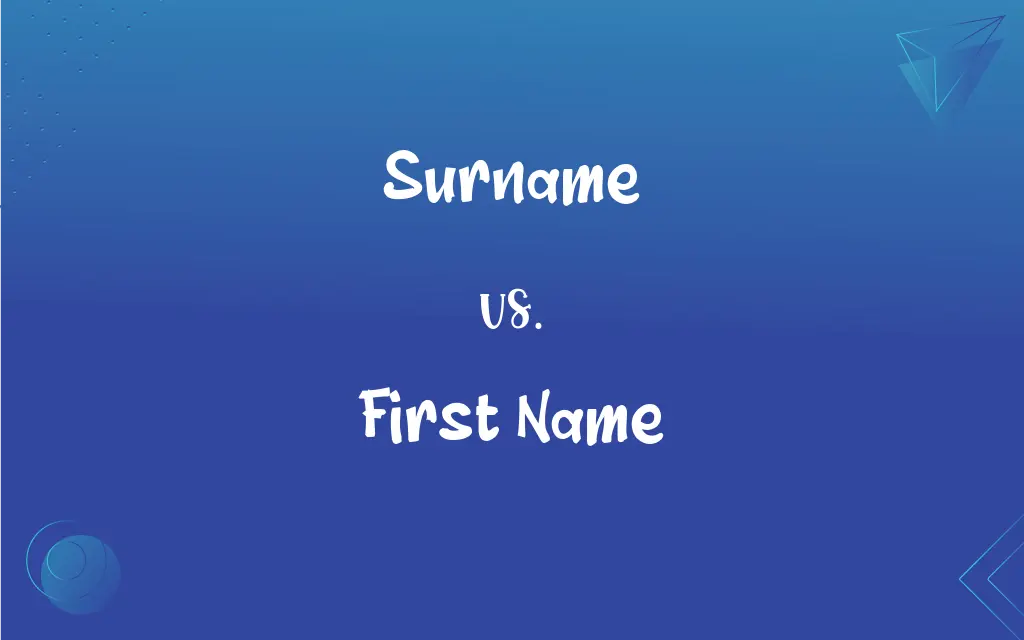Surname vs. First Name: What's the Difference?
A surname is a family or last name, while a first name is a personal or given name.

Key Differences
A surname, also known as a family name or last name, is shared among family members. While, a first name, or given name, is a personal name chosen for an individual, often at birth.
Surnames are used to identify a person's family lineage or ancestral background. Whereas, first names are used to distinguish individuals within a family or group.
In many cultures, surnames are passed down from one generation to the next, often reflecting paternal or maternal lineage. However, first names are usually selected based on personal preference, cultural significance, or family tradition.
Surnames often carry historical or geographical significance, revealing information about ancestry. First names can be unique or common, and they may carry meanings or be associated with certain qualities or traits.
In formal settings, surnames are commonly used to address individuals, emphasizing respect or professionalism. First names are often used in informal settings, reflecting familiarity or closeness.
ADVERTISEMENT
Comparison Chart
Definition
Family or last name
Personal or given name
Purpose
Identifies family lineage
Distinguishes individual identity
Cultural Significance
Reflects ancestry or heritage
Can signify personal or cultural meanings
Selection
Passed down generationally
Chosen based on various factors
Usage Context
Formal, professional settings
Informal, familiar interactions
ADVERTISEMENT
Surname and First Name Definitions
Surname
Surname refers to the last name in a person’s full name.
On the form, he wrote his surname as Johnson.
First Name
First name is the personal name given to someone at birth.
Her first name, Emily, was chosen by her parents.
Surname
Surname is a name passed down through generations.
The surname 'Garcia' reflects her Spanish heritage.
First Name
First name distinguishes a person within a family.
Each sibling in the family has a unique first name.
Surname
Surname is the family name shared by members of a family.
Her surname, Smith, is very common in the United States.
First Name
First name is used to identify an individual personally.
His first name is Michael, but he prefers Mike.
Surname
Surname can be used to trace family history.
They share the same surname, suggesting a family connection.
First Name
First name can reflect cultural or familial traditions.
Her first name, Aisha, has a beautiful meaning in Arabic.
Surname
Surname often indicates familial or ancestral background.
Her surname was changed after marriage.
First Name
First name is often used in casual, friendly settings.
Please, call me by my first name, Lucy.
Surname
A name shared in common to identify the members of a family, as distinguished from each member's given name. Also called family name, last name.
Surname
A nickname or epithet added to a person's name.
FAQs
Can first names be changed?
Yes, individuals can legally change their first names.
Are surnames important for genealogy?
Yes, surnames are crucial in tracing family history.
What is a surname?
A surname is a family or last name shared by relatives.
Do surnames vary across cultures?
Yes, surnames differ widely in origin and structure across cultures.
Can surnames reveal ethnic background?
Often, surnames can indicate a person's ethnic or geographical origins.
What is a first name?
A first name is a personal name given to someone at birth.
How are surnames used in formal settings?
Surnames are used to address people respectfully in formal contexts.
Is it common to use first names among friends?
Yes, using first names is typical in informal, friendly interactions.
Do first names evolve over time?
Yes, first names can change in popularity and usage over time.
Do surnames have legal significance?
Yes, surnames have legal importance in identification and documentation.
Can first names reflect current trends?
Yes, first names often reflect popular trends and cultural shifts.
How are surnames used in official records?
Surnames are used for legal identification in official documents.
Can surnames be hyphenated?
Yes, it's common to hyphenate surnames, especially in marriage.
How are first names used in professional settings?
First names can be used to create a friendly, approachable atmosphere.
Do first names vary in spelling?
Yes, first names can have various spellings across different cultures.
What is the significance of a first name?
First names often carry personal, familial, or cultural significance.
Are first names chosen for their meanings?
Many first names are chosen for their meanings or cultural relevance.
Can first names influence a person’s identity?
Yes, first names can play a significant role in personal identity formation.
Are surnames linked to inheritance and lineage?
Yes, surnames often signify familial lineage and inheritance.
Is the order of surname and first name universal?
No, the order can vary in different cultures.































































